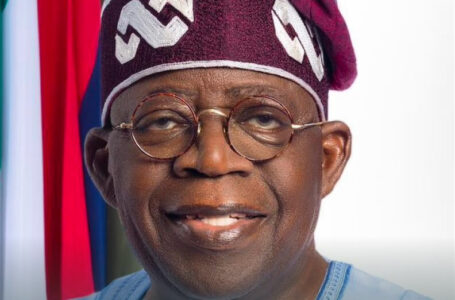WE HAVE STRENGTHENED ICRC AS ENGINE ROOM FOR NIGERIA’S INFRASTRUCTURE REVOLUTION” – Tinubu

President Bola Ahmed Tinubu has declared that his administration has significantly strengthened the Infrastructure Concession Regulatory Commission (ICRC), transforming it into a central powerhouse for the delivery of public-private partnership (PPP) projects across Nigeria.

Speaking at the 2025 Nigeria Public-Private Partnership Summit held at the State House Banquet Hall, the President stated:
“We did not come into government to maintain the status quo. We came to transform it. And that is why, under my leadership, we have strengthened the Infrastructure Concession Regulatory Commission (ICRC) into a fearless, competent engine room of Nigeria’s infrastructure revolution. The Commission has been empowered—not only to regulate and superintend PPP transactions—but to de-risk, fast-track, and ensure that our public-private partnerships deliver real results.”
The President emphasized that this move is not just a bureaucratic upgrade, but a “structural reset” designed to align policy with execution and accelerate infrastructure development nationwide.
“We are building with precision. We are building with purpose. And through the ICRC, we are building with partners who share our resolve to make Nigeria rise,” Tinubu added.

The President also used the occasion to outline broader economic reforms and infrastructure goals:
“Our national aspirations far exceed what public budgets alone can deliver. That is why we must innovate, and why we must work together. We are not looking for investors to carry burdens. We are offering opportunities to create value,” he told summit participants.
He highlighted Nigeria’s commitment to improving transparency in project pipelines, streamlining approvals, and coordinating across Ministries, Departments, and Agencies to “fast-track implementation of viable projects.”
Referencing the National Integrated Infrastructure Master Plan, the President reiterated his administration’s goal to raise Nigeria’s infrastructure stock to at least 70% of GDP by 2043, stressing:
“Blueprints do not build roads. Policies alone do not generate megawatts. These goals require collective action. And that is the focus of my administration.”
Concluding his address, President Tinubu charged the private sector to step up—not just with capital—but with innovation, integrity, and long-term commitment:
“Let this summit be remembered not for fine speeches, but for bankable projects, signed deals, and enduring progress.”
Earlier in a welcome address, the DG of ICRC, Dr. Jobson Oseodion Ewalefoh, said the Renewed Hope Agenda under President Tinubu has catalyzed a bold recalibration of public policy, placing infrastructure at the heart of inclusive national growth.
“This administration has demonstrated uncommon courage in embracing Public-Private Partnerships — not merely as a funding mechanism, but as a governance model that rewards innovation, efficiency, and accountability,” he stated.
He pointed to the range of transformative PPP projects currently being implemented across sectors. “From the Highway Development and Management Initiative (HDMI) to the MediPool medical infrastructure programme, the Ikere Gorge Dam, the Borokiri Fishing Terminal, and the MEMS platform, this administration has laid a strong foundation for sustainable, private-sector-driven growth,” the DG emphasized.
Dr. Ewalefoh also underscored the repositioning of the ICRC to serve as more than just a regulator, but as a proactive facilitator of investment. “At the ICRC, we are aligning regulation with facilitation, compliance with collaboration. We are committed to ensuring that every PPP transaction is not just legally sound, but economically viable and socially impactful,” he said, assuring stakeholders of the Commission’s commitment from project conception to execution.
Crediting the transformation of the Commission to presidential will, he noted: “President Tinubu has taken deliberate steps to strengthen the ICRC, endorsing streamlined processes that enhance our ability to deliver PPPs faster and more efficiently. In 2024, he directed all MDAs to comply strictly with the ICRC Act and Guidelines in all PPP transactions — a clear statement of his commitment to rule-based, transparent infrastructure development.”
The two-day summit featured a range of high-level activities that brought together critical stakeholders in Nigeria’s infrastructure space. Key federal ministries—including Finance, Works, Transportation, Power, Aviation, Budget and Economic Planning, Interior, and Housing and Urban Development—were well represented, along with several state governors driving PPP initiatives in their domains.
The summit also drew strong participation from international development partners such as the World Bank, IFC, AfDB, Afreximbank, and Africa 50, as well as leading private sector players like Lekki Deep Sea Port, Mainstream Energy, PAC Capital, Catamaran Group, and Transgrid Enerco. These stakeholders engaged in collaborative sessions aimed at deepening investment and strengthening Nigeria’s PPP ecosystem.
Technical discussions covered themes such as innovative financing models for PPPs, harnessing opportunities in transport—particularly roads and rail—and strategies for boosting private sector investment in power and renewable energy. Participants also reviewed case studies of successful PPP projects from Nigeria and across Africa, including the Senegambia Bridge, Cape Verde Wind Power Project, and the Lekki Deep Sea Port.






